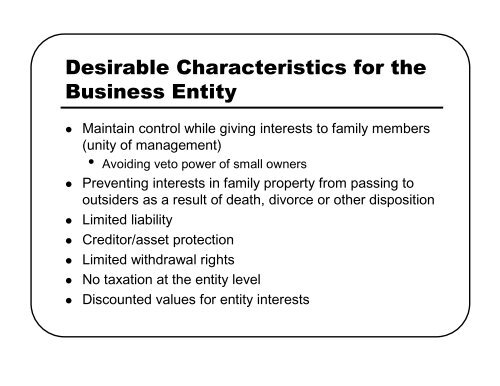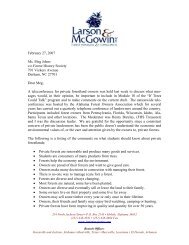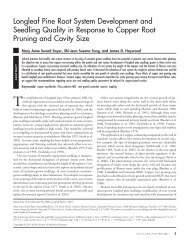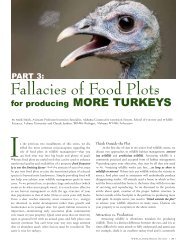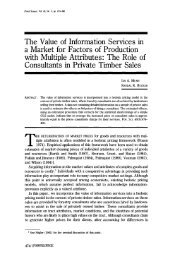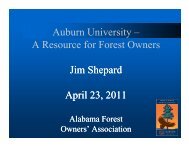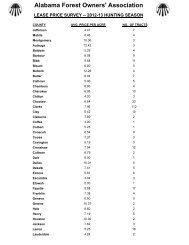Desirable Characteristics for the Business Entity
Desirable Characteristics for the Business Entity
Desirable Characteristics for the Business Entity
You also want an ePaper? Increase the reach of your titles
YUMPU automatically turns print PDFs into web optimized ePapers that Google loves.
<strong>Desirable</strong> <strong>Characteristics</strong> <strong>for</strong> <strong>the</strong><br />
<strong>Business</strong> <strong>Entity</strong><br />
• Maintain control while giving interests to family members<br />
(unity of management)<br />
•Avoiding veto power of small owners<br />
• Preventing interests in family property from passing to<br />
outsiders as a result of death, divorce or o<strong>the</strong>r disposition<br />
• Limited liability<br />
• Creditor/asset protection<br />
• Limited withdrawal rights<br />
• No taxation at <strong>the</strong> entity level<br />
• Discounted values <strong>for</strong> entity interests
<strong>Desirable</strong> <strong>Characteristics</strong> <strong>for</strong> <strong>the</strong><br />
<strong>Business</strong> <strong>Entity</strong><br />
• Facilitating gifts<br />
• Qualification <strong>for</strong> special tax provisions<br />
• Perpetual life<br />
• Avoids <strong>the</strong> difficulties with fractional interests<br />
• Avoids ancillary probate<br />
• Can be used to reduce estate taxes<br />
• Provides a succession plan<br />
• Economies of scale<br />
•Access to investment managers<br />
•Possibly negotiating reduced fees<br />
•Providing accounting and fund management
Transfer Taxation of Interests in<br />
Partnerships<br />
• Transfers are frequently valued at a discount<br />
•The value of <strong>the</strong> interest is <strong>the</strong> price at which <strong>the</strong><br />
interest would change hands between a willing<br />
buyer and a willing seller, nei<strong>the</strong>r being under any<br />
compulsion to buy or to sell, and both having<br />
reasonable knowledge of relevant facts
Transfer Taxation of Interests in<br />
Partnerships<br />
• Discounts<br />
•Lack of control<br />
•Little voice in partnership operations<br />
•Cannot obtain pro rata share by compelling liquidation<br />
•Cannot obtain <strong>the</strong> value of his interest by redeeming it<br />
•Cannot transfer his management rights<br />
•Cannot compel distributions<br />
•Must pay taxes on his allocable share<br />
•Lack of marketability<br />
•Few unrelated parties would be interested in a minority<br />
interest in a family partnership without a substantial<br />
discount<br />
•Discounts are typically 25 to 35%
<strong>Business</strong> Entities in Alabama<br />
• Single Owner • Multiple Owners
<strong>Business</strong> Entities in Alabama<br />
• Single Owner<br />
•Sole proprietorship<br />
•Limited liability company<br />
•Corporation, S or C<br />
• Multiple Owners<br />
•General partnership<br />
•Limited partnership<br />
•Registered limited<br />
liability partnership<br />
•Limited liability company<br />
•Corporation, S or C
Liability of Owners<br />
GP/RLLP<br />
LP<br />
LLC<br />
Corp.<br />
All partners are<br />
liable jointly and<br />
severally <strong>for</strong> all<br />
obligations of <strong>the</strong><br />
partnership<br />
A partner in an<br />
RLLP is not<br />
personally liable<br />
General partners<br />
are jointly and<br />
severally liable<br />
<strong>for</strong> <strong>the</strong> debts of<br />
<strong>the</strong> LP<br />
Limited partners<br />
are not<br />
personally liable<br />
Members are not<br />
liable <strong>for</strong><br />
obligations of <strong>the</strong><br />
LLC <strong>for</strong> acts or<br />
omissions of any<br />
o<strong>the</strong>r member<br />
A member may<br />
become liable<br />
because of his<br />
own conduct.<br />
A shareholder is<br />
not personally<br />
liable <strong>for</strong> <strong>the</strong> acts<br />
or debts of <strong>the</strong><br />
corporation<br />
(except amount<br />
contributed)<br />
“Piercing <strong>the</strong><br />
corporate veil”
Participation in Management<br />
GP/RLLP<br />
LP<br />
LLC<br />
Corp.<br />
Partners have a<br />
statutory right to<br />
participate in<br />
management<br />
General partners<br />
participate in<br />
management but<br />
Limited partners<br />
are prohibited<br />
from<br />
participating in<br />
management<br />
Members or<br />
managers may<br />
participate in<br />
management as<br />
provided in <strong>the</strong><br />
articles of<br />
organization<br />
Shareholders<br />
participate in<br />
management by<br />
electing directors<br />
to determine<br />
policy and<br />
appoint officers
Transferability of Interest<br />
GP/RLLP<br />
LP<br />
LLC<br />
Corp.<br />
A partner’s or member’s interest is transferable, but <strong>the</strong><br />
assignee only gets <strong>the</strong> income interest.<br />
Unless provided o<strong>the</strong>rwise <strong>the</strong> assignee only becomes<br />
a partner/member with <strong>the</strong> unanimous consent of <strong>the</strong><br />
o<strong>the</strong>r partners/ members.<br />
The partnership/operating agreement can limit a<br />
partner/member’s right to withdraw or assign his<br />
interest.<br />
Shares are freely<br />
transferable,<br />
subject to<br />
restrictions in <strong>the</strong><br />
organizational<br />
documents
Classification <strong>for</strong> Tax Purposes<br />
GP/RLLP<br />
LP<br />
LLC<br />
Corp.<br />
Generally taxed as a partnership which means “flow<br />
through”taxation (entity files an in<strong>for</strong>mation return,<br />
but <strong>the</strong> owners pay <strong>the</strong> tax on <strong>the</strong>ir individual<br />
returns.)<br />
Income is from self-employment so FICA rate =<br />
15.3%, except <strong>for</strong> limited partners or members who<br />
are not managers.<br />
<strong>Entity</strong> can elect to be taxed as a corporation.<br />
A C-corp. is<br />
subject to double<br />
taxation<br />
An S-corp. is taxed<br />
similar to a<br />
partnership
Allocation of Profits and Losses<br />
GP/RLLP<br />
LLC<br />
LP<br />
Corp.<br />
Per capita (regardless of<br />
contribution), unless modified by <strong>the</strong><br />
partnership agreement.<br />
In general, may be allocated in any<br />
manner <strong>the</strong> partners agree so long<br />
as <strong>the</strong> allocation is in accordance<br />
with <strong>the</strong> partners’interests or<br />
o<strong>the</strong>rwise has substantial economic<br />
effect.<br />
Pro rata to<br />
contributions<br />
(unless modified<br />
by <strong>the</strong><br />
partnership<br />
agreement)<br />
Profits –pro rata<br />
to number of<br />
shares, (plus<br />
salary)<br />
C-corp. –only<br />
profits are<br />
passed to s/h<br />
S-corp. –profits<br />
and losses are<br />
allocated to s/h
Creditor Rights<br />
GP/RLLP<br />
LP<br />
LLC<br />
Corp.<br />
A creditor can get a charging order.<br />
A creditor may get a judicial winding up<br />
C-corp.: creditor<br />
can seize stock<br />
S-corp.: creditor<br />
can seize stock
Family Limited Partnerships or<br />
Limited Liability Companies<br />
• 100% control regardless<br />
of ownership percentage<br />
(2% is <strong>the</strong> lower limit)<br />
• Creditor protection<br />
• Limited withdrawal rights<br />
• No taxation at entity<br />
level<br />
• Succession plan<br />
• Can be used to reduce<br />
estate taxes<br />
• Can be used to avoid<br />
ancillary probate<br />
• Perpetual life
Family Limited Partnership or Limited<br />
Liability Company<br />
• FLP<br />
•General partner has<br />
unlimited liability<br />
•Have to pay withdrawing<br />
partner<br />
• LLC<br />
•Unlimited liability <strong>for</strong> all<br />
members<br />
•Don’t have to pay<br />
withdrawing member
Disadvantages<br />
• Expense of <strong>for</strong>ming <strong>the</strong> business entity<br />
• Privilege tax –minimum of $100/year up to<br />
$500/year <strong>for</strong> a family business<br />
• Separate tax return (Form 1065)
Forming <strong>the</strong> <strong>Business</strong><br />
• FLP<br />
•File Certificate of Limited<br />
Partnership with <strong>the</strong><br />
Probate Judge<br />
•Develop <strong>the</strong> partnership<br />
agreement<br />
• LLC<br />
•File Articles of<br />
Organization with <strong>the</strong><br />
Probate Judge<br />
•Develop <strong>the</strong> operating<br />
agreement


